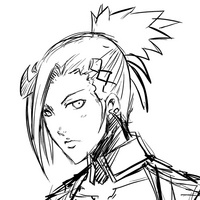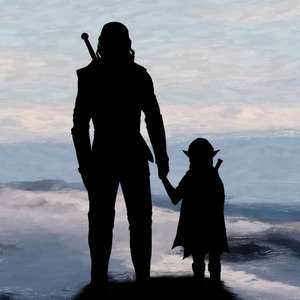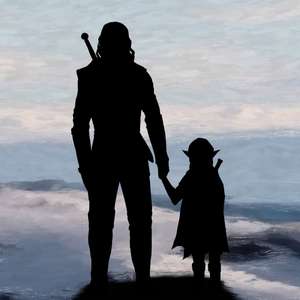On the first night of their convalescence, the crone, finished with her duties at the fire, crouched upon a stool before Mara and spoke to her. “Let me see your arm, young swordswoman, that I may tend to it, for though it may be unseemly to boast of my own talents I am the most skilled herbalist you will find in two days’ ride.”
Jaris nodded deeply, chewing a stick of sweetroot, and said to her, “Do as she says, Mara.” Though Hob skin was unlike in color that of any Man, the fire-light was dim and the old woman’s eyes weak, so he felt it safe.
The girl did so, removing her cloak, but leaving her face still covered by wrapped cloth.
The old woman brought pots of strange-smelling herbs, and mixed them with a pestle, and rubbed them into the wound with her bony fingers, saying, “Do not take offense in an old woman’s musing, but you remind me so of my lost daughter. She was no warrior, of course, never wielding any thing greater than a shepherd’s crook, but she spoke rarely, much like you, and was strong, and pure of heart. After seeing so many winters pass, as I have, you can sense what lies in a heart, you know.”
The old woman finished her treatment, and wrapped the injury tenderly, and said, “There, the poultice will drive the ill spirits from the wound and speed the healing of it. But my, your hair is so dirty! Come the morrow when the sun is out you must wash it, for even if your face must remain hidden, your hair at least can claim of the beauty within.”
And on the next day, when the sun streamed down between the new oak-leaves, the old woman boiled a washbasin of water for her honored guest, and sent Mara to the pen where the goats slept the summer, so that none would disturb her as she bathed.
But the woman had been deceitful, in part, for the girl so reminded her of her long-dead daughter that she sought to glimpse the face hidden beneath the wrappings that covered it, with the mind that it might rekindle the time-worn memory of her own daughter’s face.
And so, as Mara sat upon a stool before the basin, washing the dirt from her Hob-hair in the bright noonday sun, the crone crept about the wall of the pen to steal a look. Weak though her eyes were, there was no mistaking the face of a Hob, and the old woman cried out in alarm.
Jaris arrived upon the scene to find Mara, hair still sodden, clothing herself in great haste as the old woman hurled curses at her.
“Stay your tongue, woman,” said he. “What you have seen changes not the deed we have done for your hamlet.”
The crone’s body trembled with rage and she flew upon Jaris. “Nay, but it changes everything else. How can you walk about with a vile beast such as that, presenting it as your own daughter?”
Jaris, stalwart Knight that he was, held his temper in its scabbard. “Many Men have been wronged greatly by Hob, to be sure. But so have Men wronged Hob, and I have chosen to take her in, and raise her as I would a daughter for reasons that I need not explain save to say they are just, and she has hewn to me as a most obedient child. You yourself said she reminded you of your daughter, taken by the gods too soon.”
The old woman’s rage grew even fiercer, and she said, “Speak not as if you know me! She was not taken by the gods, she was taken by the Hob, killed for her flock! Begone from this place, and take your beast with you. Were I only a bit more the fool I would have every man among us set upon you, for the rare chance they might do you harm before your cursed steel felled them.”
Jaris but sighed sadly and said to the girl he had raised as his daughter, “Come, Mara. Our work here is finished, and the road again calls us.”
The girl did not speak, only wrapping herself in her cloak, deliberately, and following Jaris to the hut. There, things were gathered and preparations for the journey ahead made without word. Mara did not weep, for this was not the first time such a thing had befallen them, nor would it be the last.
They laced their boots and passed through the door, where they found the crone waiting for them. Her mien was of hatred, but she no longer shook with open rage. She extended to Jaris a small bag of coins, saying “This is the payment we promised. For we are people of our word, even to creatures undeserving of it, lest the gods visit ill upon us for slighting a traveler.”
This Jaris took, and thanked her for it, for he was still a Knight in treatment of all.
As the travelers set out, the old woman offered final words, never casting her eyes at them, “I have heard rumor of a place in the mountains far to the north and west of here. It is a valley called Haven, wherein Hob and Men are said to live aside one another in unnatural harmony. I know not if such a cursed place exists in truth, but if it does, it would be where your like belong. Now begone, and never again stain our hamlet with your presence.”
Jaris and Mara marched down the road among the blossoming oak trees for some while. At last, Mara said to him, “Father, think you such a place exists?”
“I know not,” replied Jaris, “but if it does, others like your true parents might have found their way there. Seek it we shall. Let not hope without foundation lift your spirits, but perhaps the gods have indeed created such a place that those with no other home might find one.”
Were that it were so, but the terrible truth the two cursed souls had no means of knowing.











Comments (0)
See all